So, you've got awesome content and you're putting in the work, but your bank account is looking a bit sad. Fear not, because pre-roll ads are here to save the day and fatten up that wallet of yours.
Pre-Roll Ads, positioned before desired video content, offer an excellent opportunity to capture audience attention.
Here are some eye-opening stats that will get your attention:
- Did you know that websites with video ads earn an average of 68% more revenue per visitor than those without?
- Over 50% of marketers worldwide name video as the type of content with the best ROI.
- YouTube, the king of pre-roll ads, reaches more 18-49-year-olds than any broadcast or cable TV network.
- In 2021, global spending on digital video advertising was projected to reach over $63 billion.
With the power of pre-roll ads and a sprinkle of strategic know-how, you can turn your content into a cash cow.
Pre-roll ads are a huge part of this sustained growth.
Today, we'll first define what pre-roll ads are and their advantages & disadvantages. Then finally, we'll give you a complete step-by-step guide on how to use them effectively in your campaigns!
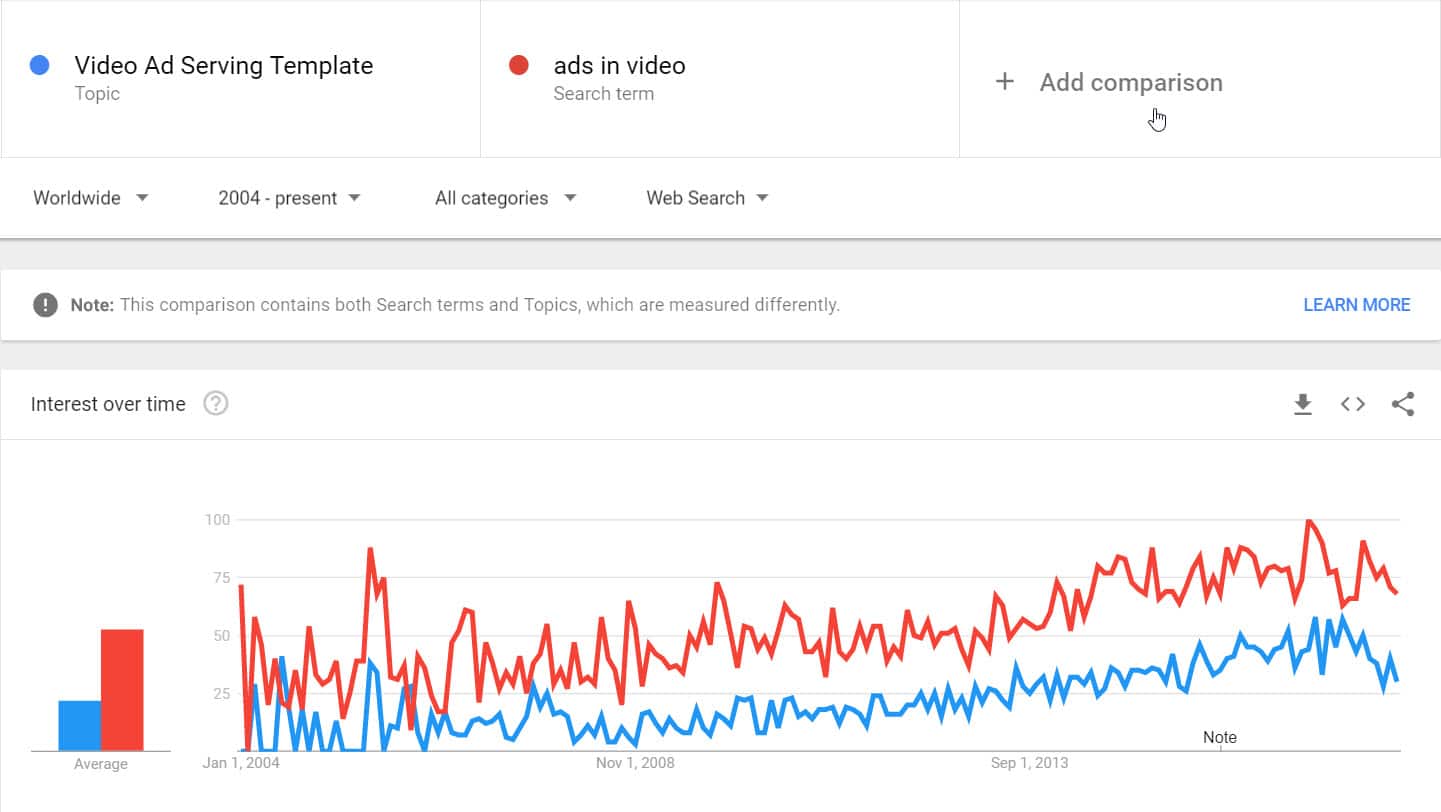
What are Pre-Roll Ads?
Also called in-stream ads, pre-rolls are short promotional clips displayed before the main content you intend to watch.
You might have also heard about mid-roll ads (video advertisements placed halfway through a video) and post-roll ads (video advertisements inserted after a video).
It’s technically all the same thing since in-stream ads can be served at any point in time during a video … however, pre-rolls are some of the most valuable real estate since every user has to start the video to watch it.
Not all of them make it to the mid-roll ad, though — with even less reaching the post-roll ad most of the time.
Typical pre-roll ad length is between 15-30 seconds, with 20 seconds being the industry standard (that’s not to say longer videos CAN’T also be in your wheelhouse! … they work just fine as long as they are engaging).
On YouTube, these clips can be served either as skippable ads after 5 seconds (or non-skippable ads for a maximum of 15 seconds). This is made possible thanks to the new TrueView video format.
Here’s a complete overview of a video ad as demonstrated by Google:
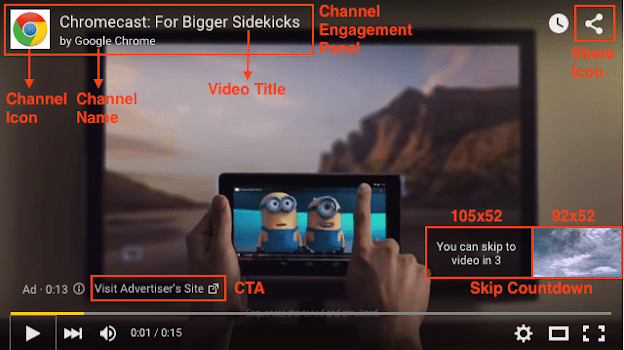
In the above example, you can see the channel engagement panel at the top left of the video player.
There’s also a call-to-action (CTA) near the play button and a “skip countdown” to the bottom right of the player as well.
Here's another example…
Notice when the skip countdown is over, the user is allowed to watch the desired content by clicking on the button? Yep.
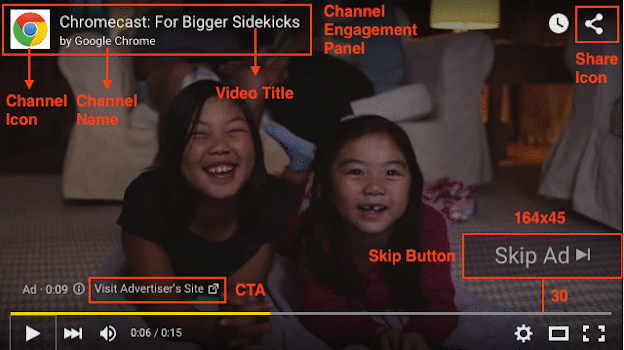
Pre-roll ads are plentiful online. Keep in mind that the advertiser controls the length, availability of the skip button, and its delay. On the other hand, publishers get to choose who they deal with and which restrictions they want to enforce.
Where Can You Find Pre-Roll Ads?
Pre-roll ads are everywhere you look online! You'll stumble upon them before watching videos on platforms like YouTube and Twitter (X) and even during live streams on Twitch or Facebook Live. They're like the appetizers before the main course of your favorite online content.
Here's more information about the prevalence of Pre-roll ads:
- Pre-roll ads are prevalent across various websites and video-sharing platforms.
- They are commonly encountered before accessing video content on platforms like YouTube, Twitter (X), Twitch, Vimeo, and others.
- Additionally, pre-roll ads are also utilized during live streams on platforms such as Twitch, Facebook Live, and others.
- These ads serve as a method for advertisers to reach targeted audiences effectively before they engage with desired video content.
What Are Different Types of Pre-Roll Ads
There are several types of pre-roll adds, each with its own characteristics and advantages:
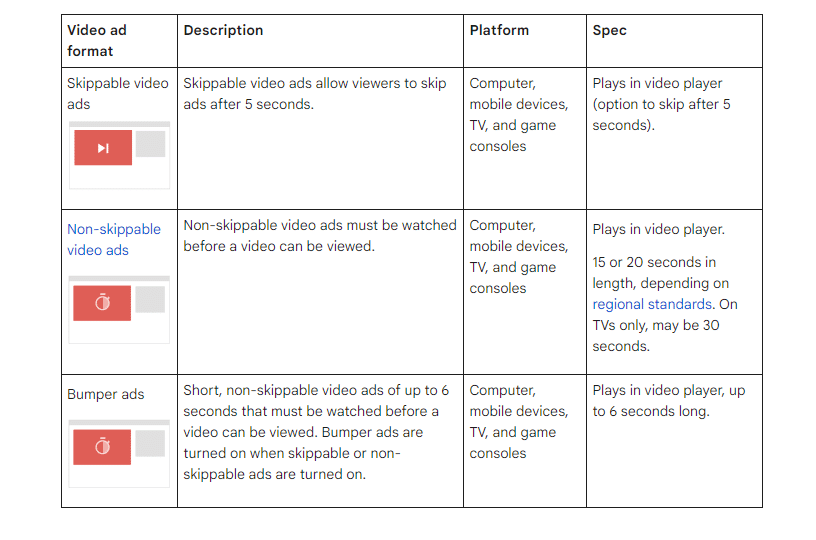
- Non-Skippable Ads: Non-skippable pre-roll ads are those that viewers cannot skip. They typically range from a few seconds to a minute in length and play before the desired video content.
- Skippable Ads: Skippable pre-roll ads offer viewers the option to skip the ad after a few seconds, usually around five seconds. Viewers who choose to watch the entire ad may be more engaged and receptive to the message, while those who skip still receive some exposure to the brand or product.
- Bumper Ads: Bumper ads are short, non-skippable pre-roll ads typically lasting only a few seconds, usually six seconds or less. Despite their brevity, bumper ads can effectively convey key brand messages or create brand awareness in a concise format.
Each type of pre-roll ad offers unique advantages and can be strategically utilized based on campaign goals, target audience preferences, and content context
Should you use Pre-Roll Ads?
Running a pre-roll ad is a smart move for several reasons. Firstly, it offers a chance to reach a highly engaged audience on platforms like YouTube, Twitter (X) and Twitch, where users are actively seeking out content.
Additionally, pre-roll ads provide an opportunity to capture viewers' attention before they dive into their desired video content. This strategy is a great way to increase the likelihood of message retention.
Finally, pre-roll ads allow for precise targeting, ensuring that your message reaches the right audience at the right time.
Overall, pre-roll ads are an effective way to increase brand visibility, engage with potential customers, and drive desired actions. This advertising technology is one of the most promising right now.
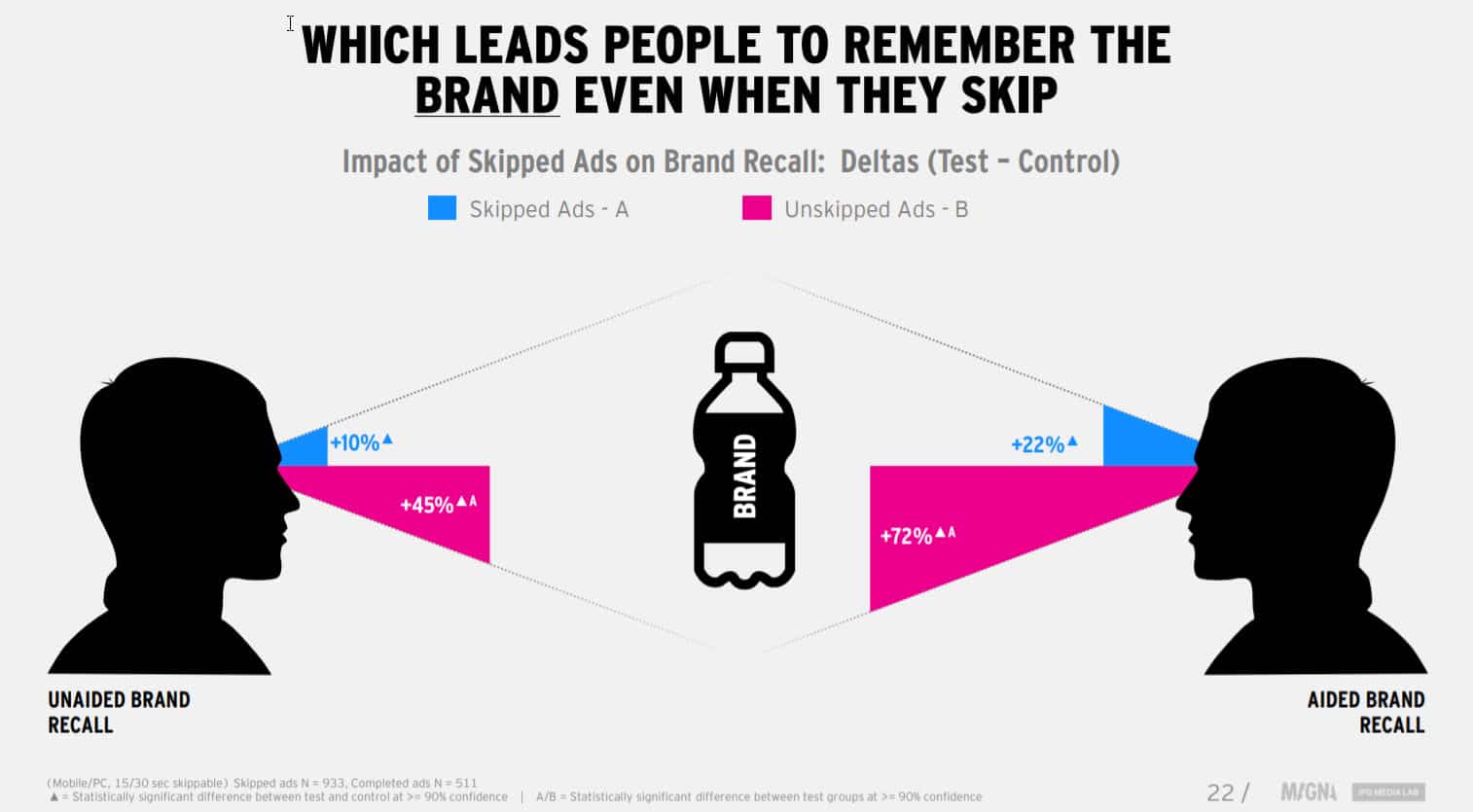
Here are the main advantages:
- Brand awareness: you can't miss a pre-roll ad because it plays before the content you really want to see. These guaranteed views are great if you have a creative mind to grab the attention of the user and you've done your homework targeting your ideal customers.
- Brand recall: did you know that a majority of viewers skip pre-roll ads when they have a chance? According to a study, non-skippable ads can rack up completion rates as high as 80%, while skippable ones often struggle to hit the 40% mark.
- Interactivity: users can choose to skip your ad, click on your CTA, share the content and more. You also have the possibility to add overlays or other tools inside the video for maximum engagement.
- Easier to grasp: due to their brief nature, pre-roll ads don't require the same effort from viewers as what airs on TV, for instance. You also only have one ad shown before the content, so your message doesn't get lost in the mix, either.
- The future is video: According to Statista, targeted video ads are huge in the digital advertising world, ranking as the fourth largest sector. They're expected to rake in a whopping $92.3 billion in revenue in 2021, and that number's forecasted to skyrocket to $162.2 billion by 2026.
Pre-roll ads also have to face their fair share of challenges:
- High Cost per thousand (CPM): a lot more advertisers are getting into the video advertising game, resulting in a price hike. Of course, it varies greatly depending on the ad network used and the targeted keywords. US and Canadian traffic is especially costly.
- Higher production values: pre-rolls are harder to create than, say, static banners or GIFs. You have to invest more resources and time in conceptualization and production. You can leverage this disadvantage by promoting pre-rolls that have already been created and are optimized by the advertiser.
What About Ad Blocking?
Contrary to popular belief, pre-roll ads are just as susceptible to the effects of Adblocker as any other type of ad.
If for instance you browse YouTube or Twitch.tv while having Adblock Plus activated, video ads will effectively be dodged. And now that Chrome has its own integrated ad blocker, It’s even more tricky. Hence the need to create content that is 1) short and 2) to the point — just like you would with banners, for example.
It's important to remember that pre-roll ads are one of the main reasons people turn to Adblockers in the first place:
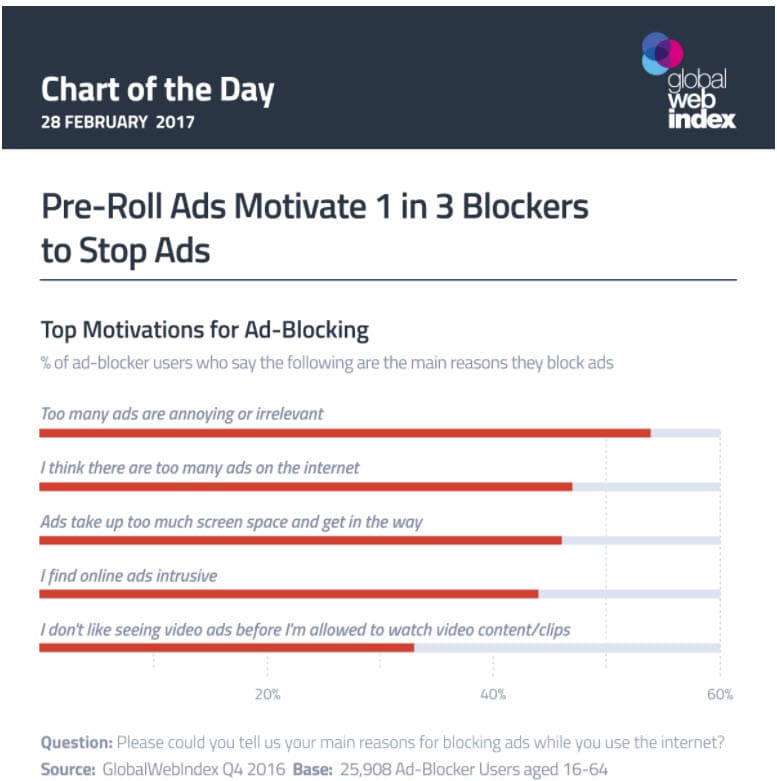
Pre-roll ads Motivate 1 in 3 blockers to Stop Ads Altogether (Global Web Index)
Pre-Roll Ads Best Practice for Affiliates and Publishers
For affiliates and publishers, mastering the art of pre-roll ads can be a game-changer in maximizing revenue and interaction.
To create effective pre-roll ads, it's important first to understand the preferences of your audience. Keep them short, sweet, and relevant to the video content they're about to watch.
Note: Consistency is key! Aim for a smooth integration of ads into your content so as not to annoy viewers. Experiment with different ad formats, placements, and targeting options to optimize performance. Don't forget to track and analyze metrics to identify what works best for your target audience.
Here are some examples of best practices:
- Allow Autoplay: Get those ads rolling automatically to capture viewer attention right from the start.
- Utilize the "Call Ad Again" Feature: Keep the ad game strong by giving viewers another chance to catch your ad if they missed it the first time.
- Make a Playlist of Short Videos: Engage your audience with a series of bite-sized videos that increase the chances of ad views.
- Floating Video Players Can Boost Visibility: Float your video player strategically so your ads always stay in view.
- Contextual Targeting Makes a Difference: Create ads that match the content viewers are interested in watching.
- Allow Skipping: Give viewers the option to skip ads after a few seconds. Respect their time while still getting your message across.
- Short and Sweet: Keep ads concise and to the point to maintain viewer interest and increase completion rates.
- Observe the Best Ads Standards: Follow industry standards to deliver a smooth and non-intrusive ad experience.
How to Run Pre-Roll Ads on Your Website
Now that we know more about pre-roll ads, it’s time to put them to the test!
Step 1: Configure your player
In order to use pre-rolls, you need to first make sure your video player can actually run this type of ad.
Your player must be compatible with the Digital Video Ad Serving Template (VAST), an in-stream advertising protocol initially launched in 2008. VAST uses a universal XML schema to serve ads to digital video players.
Here’s a quick list of recommended video players that support VAST 2.0+ with their matching documentation:
- JW Player (best, self-hosted)
- Video.js
- Fluid Player
- Kaltura
- Flowplayer
Step 2: Find an ad server solution compatible with VAST
Once you got your video player up and running, it’s time to look for an ad server that is actually able to deliver your content.
A quick search on your favorite search engine will give you multiple valid choices, be sure to select a service according to your budget and monthly impressions.
Step 3: Embed your unique VAST XML in the video player
Ok, so now that you have configured your video player and have access to an ad server, you must embed your unique VAST XML. If you’re not sure how, refer to the documentation from one of the recommended video players.
Good news: if you’re a CrakRevenue affiliate, simply copy & paste the following VAST XML into the player:
https://afgr2.com/servlet/vast3/zone?zid=12529&pid=0&custom1=[aff_sub1]&custom2=[aff_id]&custom3=[source]&custom7=[aff_sub2]
Be sure to replace the [aff_sub1], [aff_id], [source] and [aff_sub2] placeholders with your own values. Source is for tracking purposes.
Step 4: Customize
At this stage, your pre-roll ad should now be working.
To maximize conversions, make sure you customize your video player to match your site’s theme!
Be careful, though: some ad servers don’t have all features enabled. For example, it’s entirely possible for a solution to not offer a skip button at all due to various constraints. Shop around for the best product according to your needs!
Testing your VAST Ad Response
If you’d like to test a VAST ad in a HTML5 video environment, you can use this nifty tool from Google.

Video Suite Inspector from Google
Simply remove the [aff_id] placeholder from your VAST XML with your actual aff ID to see a working example.
You can also use the ZEDO VAST Inspector to test your ad using either Flash or HTML5:
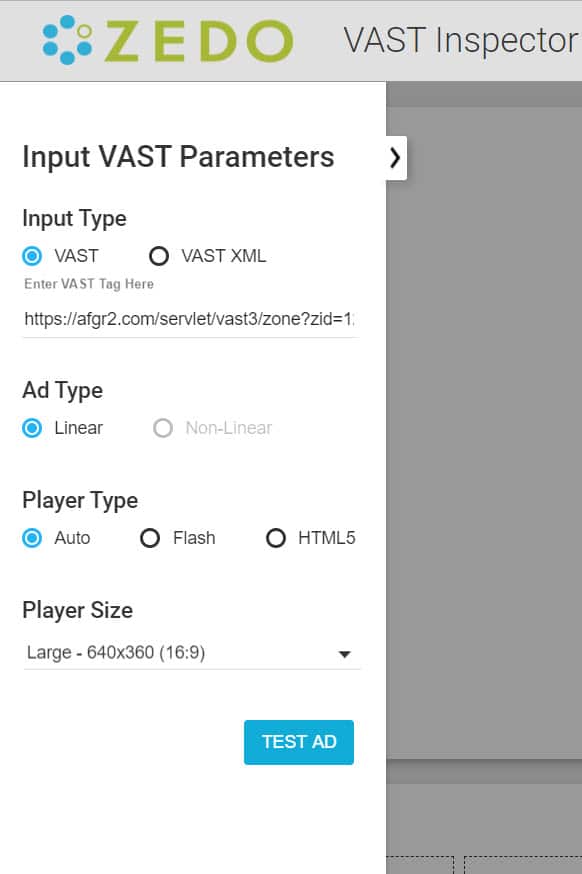
Interface from ZEDO’s Vast Inspector
Here's Why Pre-Roll Ads Can Your Best Ally
In online advertising, pre-roll ads can be a powerful ally. They offer a dynamic and versatile tool for advertisers to interact with their target audience effectively.
While pre-roll ads may sometimes be perceived as an interruption to online video viewing, they play a pivotal role in sustaining the digital ecosystem. More importantly, they provide a revenue stream for content creators and platforms.
Through targeting specific audiences and delivering concise, impactful messages, pre-roll ads enable businesses to reach their target demographics effectively.
As technology continues to advance, pre-roll ads will likely remain a valuable tool for advertisers seeking to connect with their audiences, boost visibility and earn a higher income.



